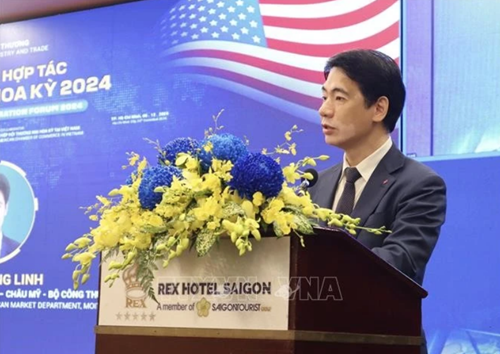Speaking to the press in Hanoi on April 3, Linh expressed the MoIT's regret over the U.S. tariff decision, effective from April 9.
Highlighting the complementarity of the two economies, including their export and foreign trade structures, he noted that Vietnam’s exports to the U.S. primarily compete with third-country goods, not U.S. products, while providing U.S. consumers with affordable, quality options.
    |
 |
|
Director of the Ministry of Industry and Trade)’s Department of Foreign Market Development Ta Hoang Linh |
The most-favored-nation (MFN) tariff rates Vietnam is imposing on imports average 9.4%, so the reciprocal tariff of up to 46% that the U.S. plans to levy on Vietnamese goods lack scientific basis and unfair, not reflecting Vietnam's goodwill and efforts in addressing trade imbalance between the two countries over the recent past, he went on.
The Vietnamese Government, ministries, and sectors have recently taken proactive steps to address many problems facing U.S. companies operating in Vietnam, including a decree reducing the MFN tax rates which benefits 13 categories of U.S. goods. Besides, a large number of U.S. investment projects have had their difficulties tackled, he said.
According to the White House, the reciprocal tariffs on trade partners of the U.S. aim to address the injustices of global trade, restore manufacturing, strengthen national security, and boost economic growth, with the tariffs remaining in place until trade deficits and perceived unfair practices are resolved.
Therefore, Linh noted, the MoIT holds that the two sides still have room to negotiate to achieve a mutually beneficial outcome.
As soon as the U.S. announced the tariffs, Minister of Industry and Trade Nguyen Hong Dien sent a diplomatic note requesting U.S. authorities delay the imposition to allow for constructive dialogue to seek a reasonable solution for both sides, Linh said, adding that the MoIT is arranging a ministerial phone call and technical talks with the Office of the U.S. Trade Representative (USTR) as soon as possible.
According to the official, the MoIT set an export growth target of 12% for this year, equivalent to about 450 billion USD, driven by a recovering global economy and Vietnam's robust network of 17 free trade agreements (FTAs) with over 60 countries and territories. While the U.S. tariffs may cause certain adverse impacts on the export growth target if the two sides fail to seek a positive solution, he assured that the ministry had foreseen such risks and prepared a detailed action plan.
The MoIT has submitted proposals to the Government and issued guidance to enterprises to mitigate potential impacts, he said.
To meet export targets, Linh called on businesses to leverage Vietnam’s FTAs and 70 bilateral cooperation mechanisms while diversifying into new markets. With the U.S. accounting for 13% of global imports and 30% of Vietnam’s export turnover, he pointed to the vast potential in the remaining 87% of global markets. The MoIT, he added, is intensifying efforts to open these pathways.
The ministry is stepping up FTA negotiations with new markets such as the Middle East, Latin America, Central Asia and other emerging markets. It is also enhancing trade promotion, upgrading logistics infrastructure, and expanding Vietnam’s network of overseas trade offices.
Looking ahead, Linh affirmed that Vietnam will restructure its economy and diversify markets, products, and supply chains to ensure fast and sustainable development. The implementation of concerted measures will help Vietnamese businesses improve their resilience to global trade volatility and maintain long-term export sustainability.
Source: VNA